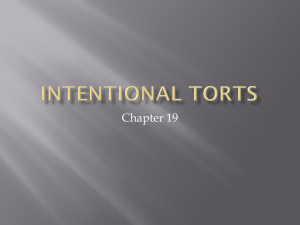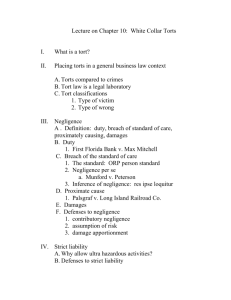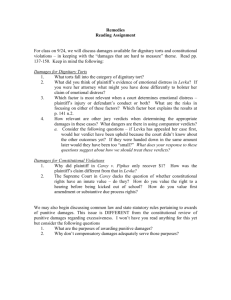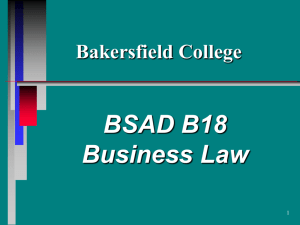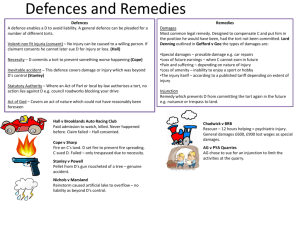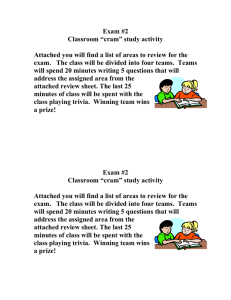intentional torts
advertisement
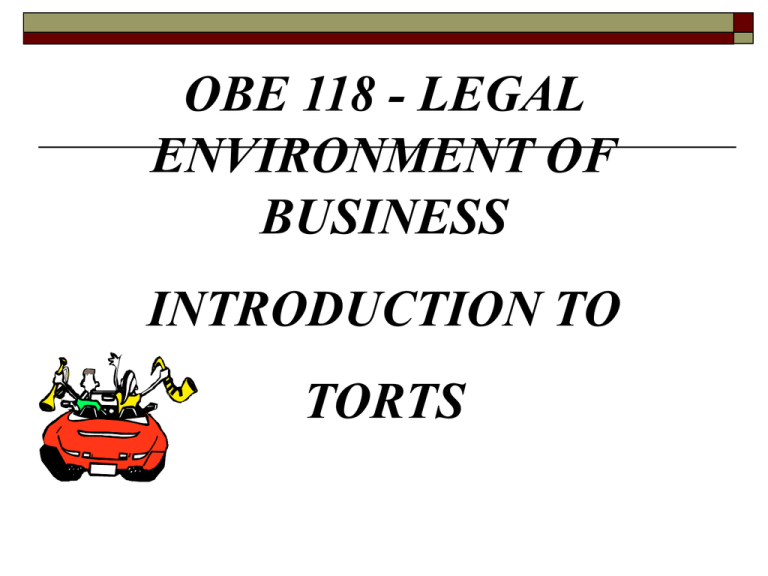
OBE 118 - LEGAL ENVIRONMENT OF BUSINESS INTRODUCTION TO TORTS “That great principal of the common law which declares that it is your duty to use and exercise your own rights so as not to cause injury to other people.” Sir Charles James Watkin Williams, English jurist DEFINITION OF A TORT An interference with another’s person or property resulting in injury to the person or their property Torts differ from crimes and contract breaches, but……have much in common with crimes. Primary distinction is in the interest affected & how an actor is held accountable. TORT compared to a crime Protects private Protects state interests interests Private victim Public recovery usually punishment $ Civil procedure Criminal procedure DEFINITION OF A TORT (CONTINUED) THE SAME ACT CAN BE BOTH A TORT AND A CRIMINAL ACT. Are Most Crimes Torts? Are Most Torts Crimes? A TORT ACT MAY ALSO HAVE CONTRACT CONSEQUENCES. Torts Are Classified By The Nature Of The Actor’s Conduct. Intentional Unintentional Negligence Absolute Liability Or Strict Liability DAMAGES Compensatory damages •A sum of money awarded to compensate the plaintiff for the injury suffered – purpose is to restore the injured person (as nearly as possible) to his or her former position or the money equivalent. •Consists of special and general damages. SPECIAL (ECONOMIC DAMAGE) - OUT OF POCKET LOSS Objectively verifiable monetary losses including SPECIAL (ECONOMIC DAMAGE) - OUT OF POCKET LOSS Medical expenses, Loss of earnings Hospital Doctor Damaged property Transportation charges Loss of use of property Costs of repair or replacement Cost of obtaining substitute domestic services Loss of business or employment opportunities DAMAGES (CONTINUED) General (non-economic damages) pain and suffering, humiliation. Subjective, losses including pain, suffering, inconvenience, mental suffering, emotional distress, loss of society and companionship, loss of consortium, injury to reputation and humiliation. DAMAGES AND TORT REFORM (a) In any action for injury against a health care provider based on professional negligence, the injured plaintiff shall be entitled to recover non-economic losses to compensate for pain, suffering, inconvenience, physical impairment, disfigurement and other non-pecuniary damage. DAMAGES AND TORT REFORM (b) In no action shall the amount of damages for non-economic losses exceed two hundred fifty thousand dollars ($250,000). West's Ann.Cal.Civ.Code § 3333. PUNITIVE OR EXEMPLARY DAMAGES Purpose is to punish "Punitive damages are & make an example damages awarded over of the actor to and above discourage similar behavior compensatory damages to punish a wrongful party because of wanton, reckless or malicious acts or omissions." PUNITIVE OR EXEMPLARY DAMAGES Conduct suggesting an award of punitive damages Violence Oppression Degradation Fraud Wicked Malice “Reckless indifference" PUNITIVE OR EXEMPLARY DAMAGES Some states provide procedural barriers to recovery Burden of proof Professional agreements to sue Sharing of award Punitive Damage Issues Intentional acts? Ordinary negligence? Contract actions? Appellate Courts? Statutory limits? Insurable? Vicarious liability? Insurable? LOW FREQUENCY/HIGH SEVERITY: Punitive damage verdicts are rare, but can be extremely large. Juries often are allowed to assess damages subjectively, creating unpredictable verdicts. DAMAGES AND TORT REFORM “While punitive damages are awarded in less than 4 percent of all civil jury verdicts, there is a 1-in-7 chance of a punitive award in disputes arising from contractual or commercial relationships, including, for example, disputes stemming from insurance or employment contracts or from unfair business practices.” From The Rand Institute DAMAGE ISSUES Judgment proof means a judgment debtor lacks sufficient assets to satisfy a judgment. DAMAGE ISSUES • Bankruptcy allows the discharge of damage verdicts against defendants except for willful and malicious injury to the person or property of another. INTENTIONAL TORTS A person intends an act which will invade another’s interest and either knows or should know (substantially certain) that there is an appreciable risk to another from the act INTENTIONAL TORTS •One intends something when an act is done and the result is substantially certain or when the result is uncertain the result is desired by the actor. INTENTIONAL TORTS •An evil or harmful motive is not required to be an intentional tort--the actor may even have intend a benefit DEFAMATION Invasion of the interest reputation. “A false unprivileged statement of fact communicated to a third person, causing damage to a person’s or a product’s reputation.” DEFAMATION Libel a writing, printing, picture, effigy, or other fixed representation to the eye. DEFAMATION Slander oral statements and gestures. Radio and other mechanical communications are slander in California. Many other states consider them libel. DEFAMATION REQUIREMENTS (Elements) Publication - communicated to a third person. Statement about a particular person. Defamatory character Damages • Intent to make the statement sufficient for most actions but Malice required when plaintiff is a public figure. DEFAMATION REQUIREMENTS (Elements) PUBLICATION - Communicated to a third person. DEFAMATION REQUIREMENTS (Elements) Statement about a particular person. DEFAMATION REQUIREMENTS (Elements) Defamatory character DEFAMATION REQUIREMENTS (Elements) Damages DEFENSES TO DEFAMATION Truth is an absolute defense. Absolute privilege may exist Qualified privilege may exist DEFENSES TO DEFAMATION Absolute privilege may exist Statements of judges, attorneys, parties, etc. Made in a judicial proceeding. Statements by legislators during legislative proceedings. Qualified Privileges Conditional or qualified privilege -freedom from malice makes these statements privileged. Ex: response to a request for information where the inquiry is reasonable. California cc 47(3). CALIFORNIA QUALIFIED PRIVILEGE DEFENSE TO DEFAMATION Civil Code §47(c), so long as the prospective employer requests the information from the former employer, and the former employer acts without malice, the communication is privileged, and the former employee cannot later recover from the former employer under a defamation theory. The privilege does not insulate employers from all liability arising from employment disclosures, especially where new employers and third parties seek recovery for injuries caused by negligent omissions or fraudulent disclosures. Qualified Privileges Constitutional qualified privilege Right to comment about public officials, & public figures. RETRACTION RIGHT Plaintiff must give notice within 20 days after publish or broadcast has made defamatory statement. Retraction is not a defense but it can limit damages. CC48a. Cal Civil Code 48a. 1. In any action for damages for the publication of a libel in a newspaper, or of a slander by radio broadcast, plaintiff shall recover no more than special damages unless a correction be demanded and be not published or broadcast, as hereinafter provided. Plaintiff shall serve upon the publisher, at the place of publication or broadcaster at the place of broadcast, a written notice specifying the statements claimed to be libelous and demanding that the same be corrected. Said notice and demand must be served within 20 days after knowledge of the publication or broadcast of the statements claimed to be libelous. No matter how often a lie is shown to be false, there will remain a percentage of people who believe it is true. FALSE IMPRISONMENT The unprivileged, unconsented confinement of another within boundaries of the wrongdoer’s making. Confinement can be through threat or physical barriers. FALSE IMPRISONMENT It did not seem like such a bad idea a few minutes ago. All Fred asked Rhonda was that she climb in the trunk to see how roomy it was in her new car. When he slammed the trunk lid and left her there while he gathered the sales manager and the other salesman Rhonda’s view of this adventure changed. She was released to the laughter of the group and Fred claimed his $100 prize from the sales manager for talking a customer into the trunk of her car. Does she have a claim for false imprisonment? SHOPKEEPERS PRIVILEGE STATUTE Allow shopkeeper to detain to investigate possible shoplifting without liability for a reasonable mistake Protection from legal responsibility for the torts of false imprisonment, assault, battery, emotional distress defamation, etc. SHOPKEEPERS PRIVILEGE STATUTE Privilege usually requires both probable cause and reasonable behavior. Probable cause exists when there is reasonable belief that a person has committed a wrongful act. Detention must be done in a reasonable manner & for a reasonable time INTENTIONAL INFLICTION OF EMOTIONAL DISTRESS Extreme or outrageous behavior resulting in severe emotional distress to another. Harsh words alone are not enough A very complicated tort. An emotional assault. Must exceed bounds of normal behavior. Some states require that the mental disturbance manifest itself as a physical illness. INTENTIONAL INFLICTION OF EMOTIONAL DISTRESS Old English case - (1897). Joker told a woman that her husband injured in an accident and was lying at elm street with both legs broken. INVASION OF PRIVACY Unreasonable interference with another’s privacy. Most persons have a reasonable right to solitude and freedom from public prying. Several acts qualify as an invasion of privacy: Intrusion on an individual’s affairs or seclusion. Includes wiretapping, invading a person’s home to search it, and window peeping. INVASION OF PRIVACY Public disclosure of private facts disclosure is offensive to a reasonable person. Disclosure is not of legitimate concern to the public. EXTRA: SCANDAL IN PROFESSOR CARPER’S CLASS. Two students found awake after 45 minutes of lecture. APPROPRIATION Use of a person’s name or picture for commercial purposes without permission Often treated as a form of invasion of privacy We each have a property right in the use of our own name Note the Bette Midler case CONTRACT INTERFERENCE REQUIREMENTS Existence of a valid enforceable contract Third party awareness of the contracts existence The third party intentionally causes one of the parties to breach the contract for the purpose of the third parties economic gain. CONTRACT INTERFERENCE Texaco v. Pennzoil 7.53+3 billion punitive=10.53B Texaco & the Ten Billion Dollar Jury by James Shannon ASSAULT An intentional, unexcused act that creates in the mind of another person a reasonable apprehension or fear of an immediate harmful or offensive touching. EXAMPLE: Ferd throws a bucket of oil at Cantwell. If Cantwell sees the oil or bucket coming, it is assault. BATTERY: An intentional unprivileged un-permitted harmful or offensive contact by another. EXAMPLE: Ferd throws a snowball at Cantwell and it hits Cantwell COMMON DEFENSES TO INTENTIONAL TORTS Consent: permission freely given or reasonably implied. Did the act exceed the permission or consent? COMMON DEFENSES TO INTENTIONAL TORTS PRIVILEGE: A right to engage in certain behavior arising from relationship or circumstance. DEFENSES -PRIVILEGE- Conflicting and overlapping meanings An advantage; a right to preferential treatment An exemption from a duty others like you must perform DEFENSES -PRIVILEGE Self defense - right to use force which reasonably appears necessary for protection of ones self. Apparent necessity Reasonable force Defense of others - right to assist others if they would have had the right to defend themselves. DEFENSES -PRIVILEGE Recapture of chattels - right of one in fresh pursuit of goods wrongfully taken to use reasonable force to retake. Force that is likely to cause death or great bodily injury can never be used just to protect property. DEFENSES (CONTINUED) DEFENSE OF PROPERTY. Reasonable force may be used in attempting to remove intruders from one’s home, although force that is likely to cause death or great bodily injury is not justified in defense of property. SOCIAL PRIVILEGE - Right to engage in normal social behavior. DEFENSES (CONTINUED) SHOPKEEPERS PRIVILEGE. “May detain person for a reasonable for a period in reasonable manner, of probable cause exists that a theft has occurred.” STATUTE OF LIMITATIONS •NEGLIGENCE - One year from injury
